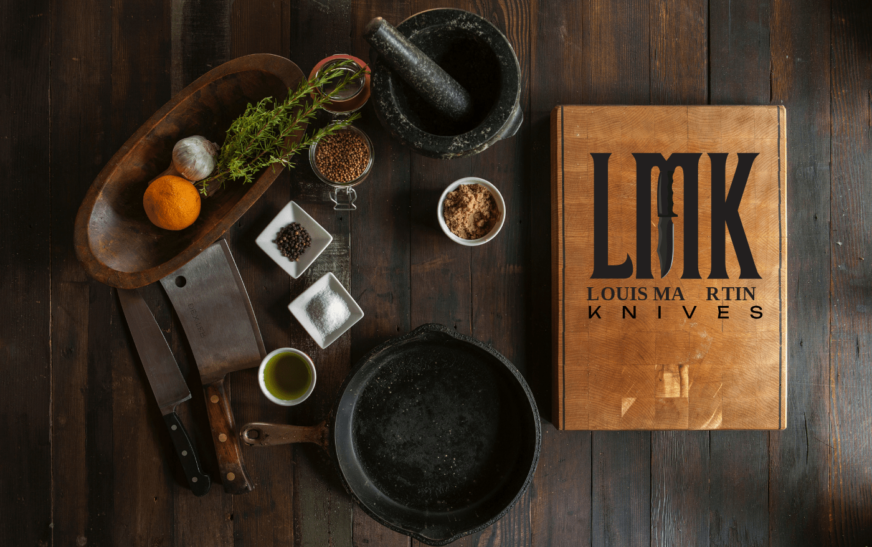In the ever-evolving culinary world, where precision, technique, and creativity reign supreme, one tool stands out for its craftsmanship and impact: the handmade knife. While commercial kitchen knives are often mass-produced with uniform standards, handmade knives offer a level of personalization, quality, and artistry that is transforming the way chefs approach their craft. This article explores how handmade knives are revolutionizing the culinary world by enhancing performance, elevating aesthetics, and redefining the chef’s experience.
The Craftsmanship Behind Handmade Knives
Handmade knives are more than just kitchen tools; they are the result of meticulous craftsmanship. Each knife is carefully forged, ground, and honed by skilled artisans who often spend years perfecting their techniques. The process begins with selecting high-quality steel, which is then heated, hammered, and shaped to create a blade that combines strength with sharpness. Unlike mass-produced knives, which may lack individuality, handmade knives are tailored to meet the specific needs and preferences of their users.
Customization and Personalization: One of the most significant advantages of handmade knives is their customization. Artisans work closely with chefs to understand their needs, preferences, and cooking styles. Whether it’s a specific blade length, handle material, or unique design features, a handmade knife can be crafted to fit the exact specifications of its owner. This level of personalization ensures that the knife is not only functional but also a reflection of the chef’s personality and style.
Superior Quality and Durability: Handmade knives often use premium materials and traditional forging techniques, resulting in superior quality and durability. High-carbon steels, Damascus patterns, and custom heat treatments contribute to blades that maintain their sharpness longer and resist corrosion better than many commercial counterparts. The attention to detail and quality control in handmade knives means that each piece is built to last, offering a lifetime of exceptional performance.
Performance Benefits in the Kitchen
The influence of handmade knives extends beyond aesthetics and craftsmanship; they also significantly impact kitchen performance. Chefs who use handmade knives often find that these tools offer unparalleled precision, balance, and control, leading to a more enjoyable and efficient cooking experience.
Precision Cutting: The craftsmanship behind handmade knives allows for exceptionally sharp edges that enhance precision in cutting. Whether it’s slicing delicate herbs, filleting fish, or chopping vegetables, a handmade knife provides the sharpness and control needed for intricate tasks. This precision not only improves the quality of the food but also contributes to the chef’s efficiency in the kitchen.
Balanced Design: Handmade knives are designed with a focus on balance and ergonomics. The handle, blade, and overall weight distribution are meticulously crafted to ensure that the knife feels comfortable and natural in the chef’s hand. This balance reduces fatigue during extended use and allows for more controlled and deliberate movements, which is essential for tasks that require precision.
Enhanced Cutting Experience: The unique blend of materials and design features in handmade knives often result in a superior cutting experience. The smooth glide of a well-forged blade through ingredients is a testament to the skill of the artisan and the quality of the materials used. For many chefs, this enhanced cutting experience transforms their approach to cooking, making it a more enjoyable and rewarding process.
Aesthetic Appeal and Collectibility
Handmade knives are not just functional tools; they are also works of art. The aesthetic appeal of these knives adds a layer of sophistication to the culinary world, making them prized possessions for chefs and collectors alike.
Artistic Expression: Each handmade knife is a unique piece of art, often featuring intricate patterns, custom engraving, or distinctive handle designs. The combination of materials, such as exotic woods, metals, and decorative elements, allows artisans to create knives that are not only functional but also visually stunning. For many chefs, owning a handmade knife is a way to express their individuality and appreciation for fine craftsmanship.
Collectibility and Value: The rarity and quality of handmade knives make them highly collectible. As with other forms of art, the value of a handmade knife can increase over time, especially if it is crafted by a renowned artisan or features unique design elements. Collectors and enthusiasts often seek out these knives for their beauty, historical significance, and potential investment value.
Redefining the Chef’s Experience
The impact of handmade knives extends beyond their immediate functionality and aesthetics; they also redefine the chef’s overall experience in the kitchen. By offering a personalized and high-quality tool, handmade knives elevate the cooking process and contribute to a deeper connection between the chef and their craft.
Connection to the Craft: Using a handmade knife fosters a deeper connection to the art of cooking. The effort and skill that go into creating each knife resonate with chefs who appreciate the attention to detail and craftsmanship. This connection enhances the chef’s respect for their tools and encourages a more mindful and intentional approach to cooking.
Inspiration and Creativity: The artistry and uniqueness of handmade knives can inspire creativity in the kitchen. Chefs who use these knives often find themselves experimenting with new techniques and ingredients, driven by the joy of working with a tool that reflects their passion and skill. This inspiration can lead to innovative dishes and a more fulfilling culinary experience.
Conclusion
Handmade knives are revolutionizing the culinary world by offering unparalleled quality, customization, and aesthetic appeal. Their impact goes beyond mere functionality; they enhance the chef’s performance, elevate the art of cooking, and redefine the experience of working in the kitchen. As the culinary world continues to evolve, the artistry and craftsmanship of handmade knives remain a testament to the enduring importance of skill, dedication, and innovation in the pursuit of culinary excellence.
For chefs and enthusiasts alike, investing in a handmade knife is more than just acquiring a tool; it’s embracing a tradition of craftsmanship that enriches the culinary journey. As these knives continue to make their mark, they remind us that the art of cooking is as much about the tools we use as it is about the passion and creativity we bring to our craft.
Feel free to submit more guest posts through Links Building Servcies - Best Prices. Buy Author Account / 1$ Guest Post Here





















